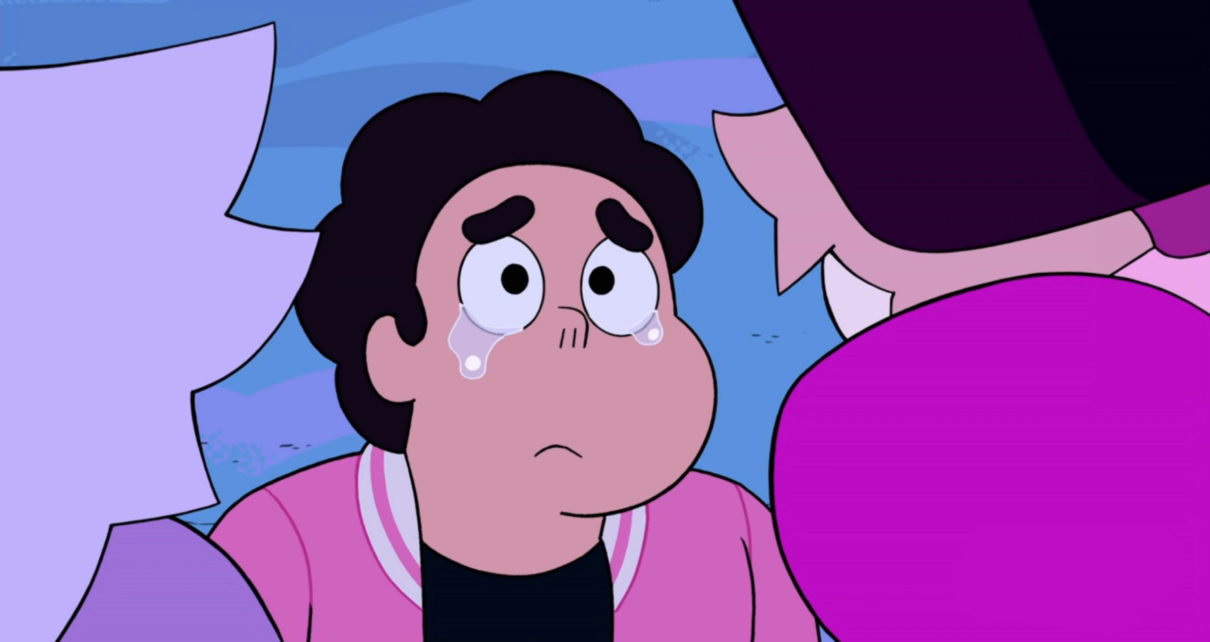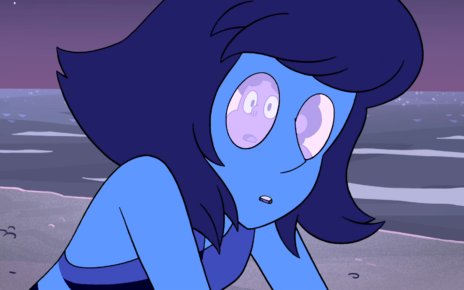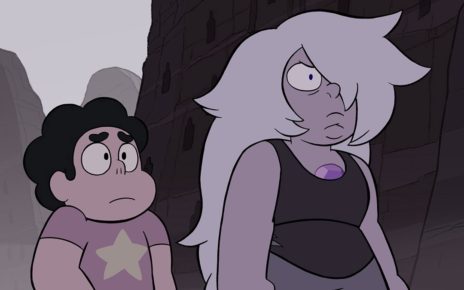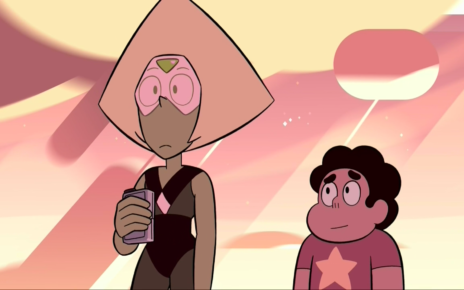In Steven Universe, our plucky, bright-eyed, half-alien, half-human hero cleaned up the messes around him. In Steven Universe Future he finds that, years later, his own messes need to be tended to. Now that its final four episodes, including series finale “The Future,” have aired, it’s time to look back on the legacy of Steven Universe, a show the Dot and Line has watched, covered, critiqued, and cried over since the very beginning of this publication. Co-editors John Maher and Eric Vilas-Boas will be your hosts.
[A recommended soundtrack for reading this conversation.]
Eric Vilas-Boas: Why don’t we start on surprises. For someone who loves this show and who openly wept for most of the last five minutes of “I Am My Monster,” I have also been quite cynical about the prospect of Steven Universe ending. I’ve wanted the show to speedily wrap up since sometime around Season 4—mostly because I was terrified that it’d inevitably diminish in quality. And yet I also thought Season 5 was basically perfect, that the movie was basically perfect, and now I think Steven Universe Future, while not exactly perfect, proved more than capable of telling important truths about Steven’s character that we hadn’t really seen before.
Steven Universe Future surprised me how much I did want the writers and artists to more directly confront the failures of Steven’s upbringing and what that may have done to his development. This is a child who has never been to a doctor or a school, never been given the option of knowing his family members, lived out of a van and in the care of well-meaning but woefully ill-equipped family. None of the circumstances of Steven’s life make villains of Greg and the Crystal Gems, but they clearly screwed him over in ways that had nothing to do with magic powers or intergalactic battles. There’s something very human in Steven’s trauma originating from mundane sources. I didn’t even know how much I wanted to see the next step of that play out, but I craved the angst we saw in this season as it slowly unfolded. And the Gem puberty analogue that Steven went through was a smart way to tackle that.
What surprised you about these Steven Universe Future episodes?
John Maher: I think the thing that surprised me the most over the course of Steven Universe Future—and this is something I came to recognize, I think, through conversations with a very smart colleague of mine at Publishers Weekly—is just how out to lunch his chosen family is on what’s going on with him. I understand that this was probably a necessary choice that Sugar and her writers made in order to allow for the central theme and antagonist, Steven’s trauma, to build unchecked until it was a legitimately dangerous force to those around him as well as to himself. It still surprised me, if not shocked me, that the Crystal Gems could be so cavalierly oblivious to Steven’s well-being, considering that over the course of five seasons they were overly attentive to him and his needs.
I hate to start this conversation out with a negative and I want to be clear that, despite being one of those viewers/critics who thought that the end of Steven Universe Season 5 was perfect and didn’t need any more of the show, I have eaten my hat on that point. I genuinely think the movie and SUF addressed important aspects of Steven’s character—namely, the inevitable manifestation of his severe childhood trauma and his coming full circle, for all the good and ill that entails, on his declaration, in episode S4E24 (“I Am My Mom”), the he is his mom—that the first show couldn’t have and shouldn’t have. So I guess I’m also surprised that I actually am glad for the more I got, even when I thought I didn’t want it.
EVB: Well, it’s funny that you say that about starting this off on a negative, because it’s sort of a disclaimer we’ve always had, right? We’ve followed and loved this show for more than half a decade now and any criticism I have for it at this point boils down to the questions of “Did Steven Universe Future continue to build on its core themes in a way that felt true to the characters?” and “Did Steven Universe Future do that in a way that felt equal to its efforts in earlier seasons?” To both those questions, I would answer “Yes, obviously, are you kidding me? It’s Steven Universe.” I feel so close to these characters at this point and so trusting of the show’s creative team, and they haven’t betrayed that trust in any way as they tackled increasingly more mature material involving their protagonist.
JHM: It definitely did build on its core themes, and it also took those themes where they needed to go if the show was going to keep relevant to its aging audience: a darker place filled with consequences. That’s one of the reasons why, to come back to your prior point about how Steven’s trauma is tied to his family members, the choice to go deeper into the aftereffects of Steven’s traumatic childhood really worked for me, even if it felt rocky at times. One thing about Steven’s family and how they “screwed him over” in particular resonated with me, and I would bet that it resonates with the vast majority of children who grew up dealing with childhood trauma: your parents and family can love you more than life itself, and they can be incredibly supportive and caring and kind, and they can still utterly, fundamentally miss what is going on with you. In that way, this part of the show felt very true to life—and maybe that actually, in some ways, redeems its sidelining of the Gems and their typically very attentive love for Steven. For them, the battle is over—the Diamonds are defeated, and everyone’s working together to rebuild, thanks to Steven, and they’re so relieved that their millennia-long war is over that they don’t realize that another battle is being fought in Steven’s psyche right in front of their noses.
I think, too, that the scene in which Steven loses his temper with Greg because Greg isn’t realizing that Steven is seeing the grass as greener on the other side is a good example in pointing this out: even the best parents can be totally oblivious, and Greg…is a kind and loving and generous parent, but he’s not a good parent. And neither are the Gems! They are a loving, supportive family, but they were raising a child in the midst of an intergalactic war and, eventually, hinging all their hopes upon him and saddling him with the very responsibility that would eventually unmoor him: the weight of his mother’s life and choices. So maybe, even though the show didn’t have the time to unpack all that—and shouldn’t have tried, since fundamentally this was always going to be about Steven—it wasn’t wrong to take that direction.
EVB: It’s worth contextualizing what the Gems knew about parenting in the thousands of years before they met lil baby Steven—which was absolutely squat. Steven did a lot of growing up in the few years (timeline-wise, is that right?) that we see play out in Steven Universe. They likely assumed that once he self-actualized by the end of Season 5, like we did as the viewers, that his growing up was over and done with and checked back out. Obviously not the case.
Which again, isn’t wrong. It’s not even really neglectful, exactly. But Steven as a function of his upbringing also never learned how to advocate for himself or ask for the love he needed, because he was always on his own. It’s why Connie’s speech in “I Am My Monster” hits so hard.
And for all the messiness this season had, particularly in the early hits—the side characters that didn’t really build toward anything, the early bits of Jasper’s arc that felt a bit aimless, the whole thing with Aquamarine and Eyeball which I’d forgotten about until you reminded me—the last run of 10 episodes I think is as strong as any since since the early episodes of Steven Universe. I loved Kaiju Steven and I loved the climactic group hug and the fact that the Cluster came back, and I especially loved that Connie played the voice of reason when I felt that we didn’t get enough of her in the battles on Homeworld. What else stood out for you this season?
JHM: I still wanted more of Connie—that kiss! In general, I think I always wanted more of some of the side characters, and that says some great things about Rebecca Sugar: her characters were always so deeply human and wholly wrought that I wanted them all to have more time, because I wanted to know them better. But I digress. I’ll tell you what stood out for me: JASPER IS ALTERNATE UNIVERSE VEGETA CONFIRMED. As I’ve said before, eventually every good shōnen just becomes Dragon Ball Z, and I loved how literally and slyly this show took that route.
What I really loved about SUF, though, is that it aged with its audience, and deliberately and baldly showed us the inevitable consequences of Steven’s trauma and the lack of treatment he retrieved for it in a way SU did not. Steven Universe was all about showing the power of emotional intelligence and the value of loving those around us for all involved. The Steven of that show was someone I looked up to, as much as a 30-year-old journalist can look up to a preteen cartoon character: he carried his weight with grace, and kindness, and goodness, and selflessness, and he didn’t forget to take care of himself. The Steven of SUF, however…did forget to take care of himself. And frankly, this is a much more realistic, not idealistic, portrayal of how trauma victims carry what they carry.
I consistently seen in young Steven the things I aspire and work to be; in teen Steven, I see myself as a teen. And it’s important, too, for the show’s viewers to see this Steven: the one who is deeply hurt, and who hasn’t addressed it, and who must, for the sake of himself and all those who love him. It’s important, too, for those who love him to see it, and to respond as they finally did at Connie’s behest: with support and love and care worthy of that he has always given them.
I agree with you that the penultimate episode was simply stellar—I have been needing a good cry for a while, and as usual, this show delivered—and although I found the final episode a bit too diffuse, in spite of a lovely time-is-a-flat-circle callback to S1E1, I also truly loved the delicacy and thoughtfulness and kindness of the last couple of minutes of the finale—it wasn’t quite “Change Your Mind,” but it’ll do. I think what really stood out for me, though, was “Growing Pains,” the episode where Steven goes to Dr. Maheswaran for his first physical ever and Sugar uses it as an opportunity to teach her audience, very clearly and directly but without being preachy, about childhood trauma. To think that a network television show would just…do that. It says a lot about where we’ve come in terms of addressing mental health in entertainment, and even more about Sugar’s dedication to bettering the world she lives in. What a thing.
EVB: I mean, I adored basically everything involving Connie this season, probably more than I have since the first appearance of Stevonnie, even. I also found myself thinking a lot about our various headlines and pieces we’ve published since this show started. As you call back, “Steven Universe is my ideal me” was a quote that stuck out to me from your piece. But so did “If every pork chop were perfect, we wouldn’t have hot dogs,” and “Why can’t I move on?” and “You’re allowed and expected to invent who you are. What an incredible power. The ability to grow up.”
That last one was Rose talking to Steven way the hell back in “Greg the Babysitter,” which aired July 29, 2016, and wouldn’t ya know it—it wound up being Steven’s final power! This season felt like the fulfillment of that promise, made by a character we later learned was as flawed a parent and comrade as can be. It was also made in a very different time for our country, our world, and not to get grossly meta about it, but the Dot and Line itself. I love that we’ve grown with this show and covered its many emotional beats, just as its younger audience has grown up alongside Steven. I’m absolutely convinced he’ll become today’s kids’ (Generation ZZ Top?) Harry Potter or Lyra Belacqua, assuming he doesn’t qualify for that level already.
This circles back to what I was afraid of in the last couple seasons: that Steven Universe would not end. We care about Harry Potter and Lyra Belacqua and Finn the Human’s arcs because they change and eventually do grow up. And while Steven absolutely grows and changes in the first five seasons, in a darker, alternate universe, our counterparts got a Steven whose role looked closer to that of Arthur or Dora the Explorer—an interchangeable pedagogue of empathy and social development. Now, Arthur and Dora the Explorer are massively important cartoon characters, but they do not relate the stories of heroes. They will never be canonized in that way. Steven already is, and for a certain type of kid, he’s probably cooler than Batman. And he got to learn from all these experiences and leave home? It’s hard to write about this show without being anything but earnest, but that’s fucking badass.
I’ll also say: I don’t think Jasper being an AU Vegeta is where the DBZ analogues end. Steven exits Steven Universe Future roughly around the same age that Goku exited Dragon Ball. And of course, Dragon Ball ends with Goku and Chi-Chi getting married, whereas Connie… is a lot smarter about when she wants to make decisions like that. Now, to be clear, I DON’T WANT MORE STEVEN UNIVERSE RIGHT NOW, but I think the way to continue the show, if they were ever going to continue the show, would be to tell whatever the next generation’s story was. It’ll never happen, but as you say, every shōnen inevitably becomes DBZ, and this is a show that has referenced DBZ since the start.
JHM: It has, but no matter how many influences this show has had—and there have been a lot—it’s worth pointing out that there has simply never been a show on television like Steven Universe. Growing up, I never could have dreamed that such an expansive depiction of love, war, family, community, LGBTQIA+ issues, trauma, and growing up, examined through the lens of post-apocalyptic science fiction for an all-ages audience, would ever even air on TV, let alone be as masterfully executed and emotionally powerful as this show has been on a regular basis for the better part of a decade. And while I’ve spent a hell of a lot of time watching, and writing about, cartoons featuring protagonists with dead parents and traumatic childhoods, I’ve never seen any hero quite like Steven Universe.
Throughout the show’s original run, Steven is a rarity: a happy, healthy survivor of childhood trauma, and the very picture of a protective, compassionate, mindful, and loving person. He confronts his traumatic experiences but doesn’t obsess over them. He knows his personal growth is important, but he also knows that he couldn’t grow without the love and support of his friends and family—and that they, in turn, could not grow without his. He realizes that the answer to all the pain the world holds is empathy, and also realizes that, without self-awareness and self-love, empathy isn’t worth much at all. And he manages all this while still a preteen…who just so happens to be caught up in an intergalactic war, his inheritance from his very complicated late mother.
And what Steven Universe Future does so well is to show us that even the best and brightest, the kindest and most loving among us, are sure to be unmoored by carrying a weight as heavy as the one Steven has been saddled with his entire life. Sugar knew she couldn’t leave things as was. Every conflict has an aftermath. For Steven, that aftermath is the obvious consequence of the millennia-long conflict in which he was forced to take part, and of his mother’s actions and his own in that same conflict: severe PTSD. At some point, disposition and determination can’t cut it alone. Steven can’t help but feel powerless, overwhelmed, and obsessive in the wake of the years of hurt he inherited. Not, at least, until he finally confronts the root issues of his trauma. This is all too true of trauma survivors—even the healthiest and most committed of us struggle with what is left behind, and with loving ourselves in its wake.
One thing I’ve always loved about Steven Universe is how it positioned its hero as the ultimate reminder, for trauma survivors and others, of the principle undergirding the golden rule: that in order to truly love others, you also need to love yourself. I loved, too, that Steven Universe Future taught us just how hard that latter part is, especially when recovering from a wound so deep it seems unseen. In the end, war is hard, but peace is harder—recovery from a battle always takes longer than the battle itself. Sometimes, it never ends. Even when the show must.
EVB: Steven Universe is the rare series that ends with me actually excited to critique and analyze its long-term influence. I honestly can’t for the day we can look back and watch shows saying, “Damn, this feels a lot like Steven Universe!” Many of them are already out there. I’m glad you brought up the points of representation too, of being seen. Steven Universe asks that you see others but that you also see yourself. The interview Rebecca Sugar gave to Vulture illustrates this nicely, where she talks about a discarded character concept that she’s specifically avoided discussing publicly until now:
It was the idea of Perfect Steven, which was a powered-up version of Steven. He would be as big as Rose, he would be pink, and he would be really powerful. I had a doodle of it back in 2013. All of us in the room were really conflicted about the idea and ultimately said, “We can’t do Perfect Steven because Steven is perfect.” The idea that there would be a more perfect version of him that’s more powerful, or one that’s bigger, or stronger, went against all of the principles of the show.
Ultimately, Sugar says, they brought some of those ideas back for Steven Universe Future to play that tension. If you watch the episodes, you can tell that he’s not supposed to larger or glowing pink or ultra-powerful all the time. And when he tries to, it tears him apart.
“Perfect” is something we focus on a lot. Perfect is paramount. We want our children to get perfect grades. The villain Cell from Dragon Ball Z obsessed over reaching his Perfect Form. “I need the direction to perfection” is a famous lament from Brandon Flowers. Capitalism lives on the pursuit of the perfect, from perfect abs to perfect credit scores to perfect ways to spend your free time. Perfect is inescapable even in this conversation; we called seasons of Steven Universe “perfect” and “near-perfect” above, because it’s baked into the language of enthusiasm we use to discuss our faves.
But “perfect” is clearly a silly way to describe subjective art forms, just as it’s a silly way to describe individuals, animated or otherwise. More than anything, I respect that Steven Universe and Future told a story about self-acceptance, self-actualization, and self-betterment while rejecting so-called “perfection” to the bitter end.
After all, if every pork chop were perfect, we wouldn’t have hot dogs.
Thanks for reading The Dot and Line, where we talk about animation of all kinds. Don’t forget to follow us on Twitter and sign up for our newsletter.





